- Home
- Zoraida Cordova
The Inheritance of Orquídea Divina Page 4
The Inheritance of Orquídea Divina Read online
Page 4
Mike took in his perfect wife with her perfect belly in their perfect home. Then, the ice cream bowl on the floor.
“What’s going on?” he asked, picking up the mess so she wouldn’t have to stand.
Tatinelly guided his hand to her belly where he felt the thump of their child’s foot, anxious and ready to be in the world.
“We’re going to see Orquídea Divina,” Tatinelly said. She knew it. Somehow, as ordinary and plain as she was, she knew in her bones what that letter said.
Mike frowned but chuckled. “We are?”
She smoothed her belly right where the kick was the strongest. She spoke to her child directly now. “You know, Orquídea Divina was a fierce little girl, too.”
3
THE GIRL WHO GREW ON AIR
Isabela Montoya needed a name for her newborn daughter. Names were important, even if she couldn’t stay within her family’s tradition. Before her father interceded, Isabela had almost been named Matilde, after Matilde Hidalgo, an illustrious suffragette who was the first woman to graduate high school in Ecuador, the first woman to cast a vote in Latin America, first to receive a bachelor’s degree, and on and on. A woman of so many firsts, the patriarch of the Montoyas thought the name too revolutionary. Instead, Isabela Belén Montoya Urbano was named after an aunt, whose mild temper and skill at the piano had won her a successful marriage.
The new mother rifled through her mental catalog of family names. Cousin Daniela was too ugly. Berta was too prim. Caridad was a gossip. There was her aunt Piedad, who was the kindest of all her provincial relatives. But naming her bastard daughter something that meant piety was too ironic for her taste.
The maternity ward was crowded with narrow cots and new families. Isabela’s mother cut through the room to get to her daughter’s bedside. Her hair, which had been onyx black the night before, was threaded with silver strands. The woman’s face was hard as marble, her slow, careful steps like she was walking across a tight rope. Guayaquil was a crowded city, but not that big. She feared someone would recognize her, see her breaking her husband’s decree that no one, not even the gardener, was allowed to visit Isabela and the child. A girl, at that.
Roberta Adelina Montoya Urbano stood beside her daughter. She took the baby’s hand and pried apart newborn fingers with nails still so delicate they were almost see-through. She inspected the color, the lines on the palm of her hand like she’d determine her whole future.
“Mamá,” Isabela said.
Roberta shut her eyes. She withdrew a crinkled white envelope from her purse and set it on the bedside table. A good Catholic woman, she had to be able to say to her husband that she hadn’t spoken to Isabela. But he’d never said anything about giving her money.
Isabela drew her baby closer and watched her mother walk away.
A pretty young nurse rounded her bedside. She checked on Isabela’s every comfort, and asked, “What will you call her?”
In the Montoya family, it was tradition to name the first child after the father, wherever he was. But she couldn’t imagine saying his first name for the rest of her life. They’d spent one night together, and then he was gone. Before his departure, he’d given her two things, only one of them a gift. An orchid, a species which only grew in Ecuador. The ship he worked on was exporting them to Europe, but he’d stolen one for her. It was a beautiful flower unlike anything she’d ever seen—white and darkest plum and soft. She still had it, but now it was beige, pressed between the pages of a book she couldn’t will herself to ever finish. The second was her daughter, weightless, fragile, like the same flower, which didn’t need solid ground to grow.
Orquídea.
* * *
Once the sucres in the crinkled white envelope had been stretched as far as they could go, Isabela secured a job working long hours at a doctor’s office on the other side of the city, and a tiny house in an industrial stretch of land by the shore. Though she lived a stone’s throw from her childhood home, the Montoyas didn’t want anything to do with the unwed mother and unlucky girl. A bastard daughter was never to inherit land, titles, her father’s surname, or even love, which would have been free, had that strain of the Montoya clan been in possession of it.
As she grew, Orquídea quickly understood that if she wanted something, she would have to learn all the things that no one would teach her. At five years old, she walked the quarter mile to the pier. An old fisherman, who was nothing more than leathery brown skin and bones, taught her how to fish and clean the pink guts out for dinner. She gave the scraps to the cats that slunk like lazy shadows around the corner from her house.
That long dusty road flanked by cement houses with tin roofs was called La Atarazana, named after the old colonial shipyards. The ships were long gone, but Isabela made a home on the desolate shoreline, and soon, others followed. Among them, Orquídea was known as the peculiar little brown girl with unkempt black curls. Only cats liked to follow her around.
When her mother finally enrolled her in school, she learned to read and write. She also learned how to fight the girls from good families who made fun of her name, her skin, her whole existence. How to take a beating from the teachers who left her arms and hands stinging from the ruler, and later from her mother’s belt for having to be humiliated by having a daughter who fights like a puta machona.
She learned how to stitch her only uniform when the seams split and holes appeared in her socks. She learned where to pinch schoolboys who tried to shove their hands under her skirt or grab the new peach pits of her breasts. She learned how to draw blood from those pinches. She learned to bite and to frown, because it was the only way to avoid getting robbed on the way home from school. When pinching didn’t work, she learned to wield her fishing knife. She’d hold it up to a boy’s crotch and say, “I can gut a fish in two seconds. What do you think I can do to you?” Her heart raced and she was called nasty, rude, savage. But there was no one else to protect her.
She learned that no one was ever going to want her, for reasons she couldn’t control, and that praying to chipped statues of la Virgen María and el niñito Jesús didn’t come with anything but silence. She learned to survive and survived by learning.
By the time she was thirteen, she was a full-blown beauty, with lustrous black curls, skin like the darkest honey, but still peculiar and still followed around by cats, though roosters had begun to join her daily parades to the river shore.
Perhaps one of the most important things that Orquídea learned during her adolescence in Guayaquil was the identity of her father. She met him once but didn’t get his name.
On the day that she met her father for the first time, she was seven. Everyone mistook her silence for being dim-witted, but Orquídea was as sharp as the knives in her pocket. She saw the truth in people’s lies. She saw the sin in their deeds. And she saw her own face in a stranger’s. Her father, a Colombian fisherman turned sailor who’d sailed into town only once before that, was tall, with deep black skin, and the kind of smile that made women dizzy. He went back to Isabela Montoya’s old house but was told by a local boy that she no longer lived there, and for a sucre would show the sailor the correct house.
He was delighted to discover that the woman had struck out on her own but was not yet married. Isabela wasn’t home, but Orquídea had been at the table drinking café con leche and reading a book for school.
They recognized each other without needing to speak. Sometimes blood recognizes blood. It was in the beauty marks that formed a perfect triangle over their left cheekbones, in the way they craned their heads to the side to examine the oddity before them. It was in the crooked slant of their full lips, which accentuated a dimple that would claim hearts across time zones and hemispheres.
But then he spoke. He did not say his name. He did not ask for hers. He withdrew a salt-stained coin purse from the inside of his vest, took Orquídea’s small hand in his. He placed the pouch on her palm and said, “Don’t come looking for me.”
He re
turned to the docks, and that was when Orquídea learned that she was exactly like her father, untethered, belonging to nowhere and nothing and no one, like a ship lost to the seas.
4
THE PILGRIMAGE TO FOUR RIVERS
Thirteen hours into their drive, Marimar leaned over to touch the radio and Rey slapped her hand away.
“We’ve listened to this song a hundred times,” she shouted, sucking on the dregs of her drive-through soda.
“Fifty. Don’t be so dramatic.”
“You have the musical taste of a frat guy named Chad.”
Rey laughed, one hand on the wheel and the other resting on the open window. The I-70 was empty across the stretch through Indianapolis. Other than stopping to pick up some greasy food, they’d made excellent time.
“ ‘Here I Go Again’ is a classic,” Rey argued. “When it’s your turn at the wheel, you can pick the music.”
“But you won’t let me drive.”
His light brown eyes narrowed with mischief. “Exactly.”
“Fine. When we get to the house, I’m the designated DJ.”
Rey sucked his teeth. He reached for his cigarette box and pulled one out from the yellow pack. “Do we really have to do this?”
“The answer is still yes,” Marimar answered. She was barefoot, her heels propped up on the dashboard. Red painted toes wiggled against the cool midwestern air. “She’s our grandmother.”
“Orquídea Divina is finally lonely. And old. She wants attention and this is the only way to get it.” He lit his cigarette with one hand and tossed the metal lighter, another relic from his long-dead father, in the messy catchall below the radio.
“How old is she?” Marimar wondered. “I want to say that she’s somewhere between sixty and eighty.”
“You know, one time I tried to go through her things to find what she was hiding. Why she was so secretive. She had a fucking python in her drawer.”
“It escaped from a nearby zoo.”
“And it just happened to be in her dresser? Okay.” Rey scrunched up his face in mock-agreement. “It bit me.”
“Pythons aren’t poisonous. Also, I think everyone’s tried to go through grandma’s things and never found a snake, or anything super expensive worth all the secrecy. Maybe now we’re going to find out.”
“The valley’s worth gold. You think she’ll divide it among the remaining children? Oh, I call the record player. Maybe you’ll get the porcelain tea set to complete the one you stole.”
Marimar rolled her eyes and stared out at the flatlands, the highway that stretched ahead of them like an infinite movie backdrop that never seemed to get any closer. Something inside her twisted at the thought of dividing her grandmother’s things like a pie. It was bound to get messy.
“You’re not sad?” she asked.
The song restarted and Rey exhaled his disillusionment with his cigarette smoke. “I would be if she had picked up the phone every once in a while. Most grandmothers shower their grandkids with presents and praise.”
“Is that what you want? Gifts and a pat on the back?”
“I got my fucking Bachelor’s in two years instead of four and got my CPA license. I think that deserved something.” He flicked ash outside his window and leaned his head back. “I’m calling it. She’s just being dramatic. She’s probably sorry that she kicked everyone out of the house, and this is the only way to get us to come back.”
“Or, she’s telling the truth and we’ve been making too many stops. We might get there too late. What if she’s really sick?”
“Such a different tune than when she drove you away and you came to live with us. I believe your words were ‘I never want to see that old witch ever again.’ ”
Marimar remembered sitting in her room after her mother’s funeral. Cause of death was drowning. How had her mother drowned in the same lake she’d swam in her whole life? How could her mother, who’d won meets in school and swam in the Pacific Ocean, have drowned? It didn’t make sense, but Sheriff Palladino had said her mother must have hit her head on the dock and lost consciousness. By the time they’d found her, it was too late.
Orquídea liked to say that their family was cursed. But she wouldn’t say why. Marimar didn’t always believe her until that day. It had made her furious. What was the point of all of it? All of the candles, the salt in the grain, the roosters, the fucking laurel leaves meant for protection. Every reliquary her grandmother believed ordained their family with good luck was worthless because Pena Montoya, her beautiful, erratic, aloof mother, drowned anyway. If they were cursed, it was because of Orquídea. Marimar was only thirteen and certain of it. She became a wild thing. She shattered vases, jars full of roots and herbs, bottles of amber liquor. She took a kitchen knife and began cutting out Orquídea’s precious golden laurel leaves, their delicate petals etched so deep in the door and windows that she barely made a scratch.
The enchantment of the valley broke. Marimar couldn’t stand it. She boarded a bus. She took with her a duffle bag of clothes, a potted plant, and her stolen porcelain cup with big roses painted on the sides. She cried the whole way to New York.
She wasn’t crying now on the road leading home. “You can still love someone even after they hurt you.”
“Doesn’t mean we should.” Rey side-eyed her, his full mouth smirking, the cigarette burning as quickly as his nerves.
“Maybe she was right about the family curse,” Marimar said. She tried for joking but it came out morose.
“Latino families just think they’re cursed because they won’t blame God or the Virgin Mary or colonization.”
At that, she snorted. “Maybe we’re not like other families.”
“Don’t you ever feel lied to?”
Marimar eyed the radio. White Snake on a loop felt like a specific kind of torture. Her vision drifted to the perfect, periwinkle sky. “You have to be more specific.”
“Like all of her stories. The fairy creatures and magic shit.”
“All grandmothers tell their grandkids stories,” Marimar said.
“Yeah, but I always felt like Orquídea meant them. I thought she was being literal when she talked about the monsters waiting outside the house. That if she left, something would come and get her. Get us, too.”
“Maybe her monsters were real once, did you ever think about that?” Marimar turned to look at her cousin. His eyes and crooked nose were all his father, but those high cheekbones and lips were his mom’s. She remembered the boy she used to chase around. He’d use aluminum foil and tin to make himself an armor. They’d go by the lake and race up the hills and protect the land. They’d wait for the monsters that never came.
“Maybe,” he said, and the word lingered between them. “That’s only because we don’t know her. Not really.”
“Did you ever ask?”
He sucked his teeth and jammed the butt of his cigarette in the ashtray. “Did I ever ask our grandmother about her life? Obviously. All she’d say was that she was born in Guayaquil, Ecuador, and moved to Four Rivers with Papi Luis. Once, I said I needed her help for my class ancestry project, and she said it didn’t matter. I failed my fucking family tree because I couldn’t fill it out.”
“Yeah, I’m sure your kindergarten GPA was real affected.”
“It was seventh grade, bitch,” he said. “Remember when your mom died, and you asked Orquídea to get in touch with your father, and she said you were better off not knowing him? Like—”
“I know you worship your dad, but that doesn’t mean everyone wants to or does. We don’t know what her reasons were for the things she did.”
“Well, I wanted to know. Don’t you think it’s strange that Orquídea never leaves her property? That she has a cemetery full of her dead fucking husbands? She spent our whole childhoods saying how important it was to stay together, to be a family, but when her kids wanted to go their own way, she kicked them out. Orquídea doesn’t just push people away; she scorches and salts the earth. That’
s not right. That’s fucked and you know it.”
Marimar gnawed on her cuticle again. She remembered when she was a little girl and did the same thing, her thumb would be raw practically down to the bone. She’d watched in the open, airy kitchen as her grandmother had cut a leaf from her aloe vera plant, split open the green fleshy skin with the precision of a surgeon. She scooped out the jelly from inside and slathered it on her skin. It burned, and later on, when Marimar stuck her thumb in her mouth, she cried at the rancid taste, but she’d stopped sucking her thumb by the end of the week.
Marimar knew that Rey was right. Their grandmother wasn’t perfect, but she had come from a different time. They didn’t know her. But what more did Rey want?
“Do you remember lighting those votive candles and making wishes,” he asked. “She said they’d come true.”
“Yeah,” she said. “What did you wish for?”
He took a deep breath. “A boyfriend.”
She grinned wide. “Was that the summer you were caught in the barn with the Kowalski boy?”
“Best seven minutes in heaven I’ve ever had.” He drummed his fingers to the bass of the song, the crescendo that lent itself to the open road. If he closed his eyes, he could picture his father playing air guitar at the Yankees Stadium parking lot while they pregamed with hotdogs. “You?”
“Better grades, straight teeth, to meet my dad one day.” All Pena had told Marimar about her father was that he’d swept into Pena’s life like a storm and vanished just as quickly. Marimar knew Orquídea had been opposed to the union because when the subject of her father came up, she’d bite down on her tongue and grumble. Marimar knew he’d left her mother a silver ring emblazoned with a starburst, which was lost in the lake when Pena drowned.
If she could go back, if the wishes whispered to the candles on their grandmother’s strange altar could actually come true, she would have been more discerning with them. Maybe ask the universe for a computer that worked or a story inspiration that went past chapter three instead of wishing to meet the father she’d never seen. “At least I got braces that year.”

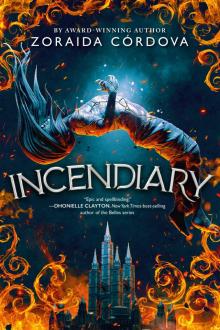 Incendiary Series, Book 1
Incendiary Series, Book 1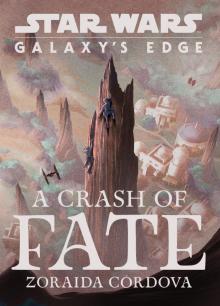 A Crash of Fate
A Crash of Fate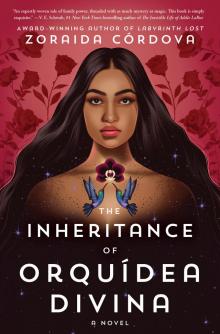 The Inheritance of Orquídea Divina
The Inheritance of Orquídea Divina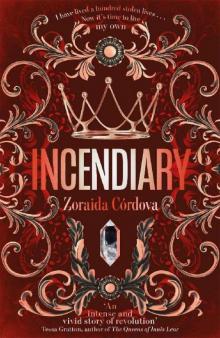 Incendiary (Hollow Crown)
Incendiary (Hollow Crown)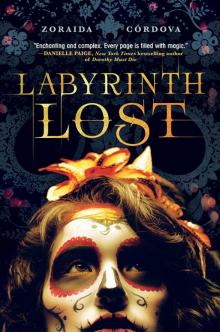 Labyrinth Lost
Labyrinth Lost Love on the Ledge
Love on the Ledge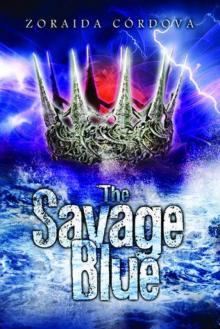 The Savage Blue
The Savage Blue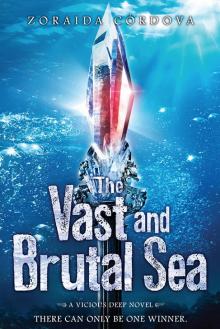 Vast and Brutal Sea
Vast and Brutal Sea Life on the Level: On the Verge - Book Three
Life on the Level: On the Verge - Book Three The Vicious Deep
The Vicious Deep Luck on the Line
Luck on the Line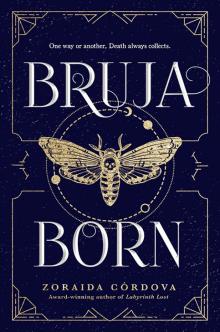 Bruja Born
Bruja Born Illusionary
Illusionary Vicious Deep
Vicious Deep